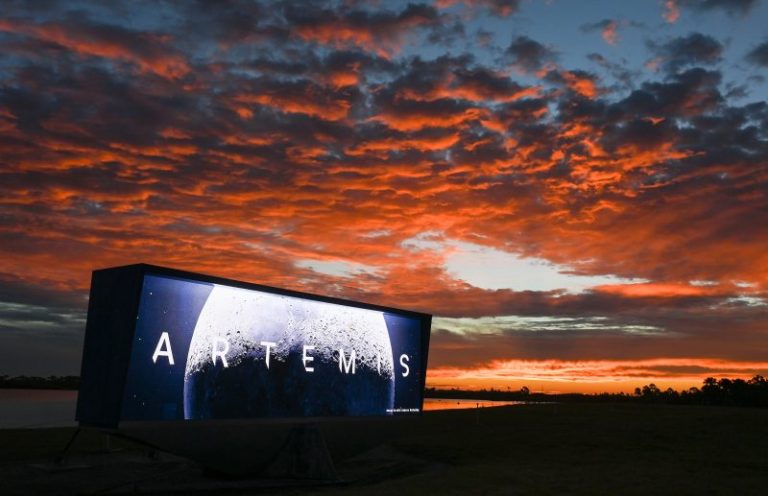NASA’s top goal might be returning astronauts to the moon under its Artemis program, but most Americans think that watching for asteroids that could hit Earth should be the space agency’s top priority, according to a poll released Thursday. Monitoring climate change was the second-most favored priority.
Respondents in a study released by the nonprofit Pew Research Center were asked to rate the importance of nine separate missions. Only 12 percent of adults think returning astronauts to the surface of the moon should be NASA’s top priority, according to the study. A human landing on Mars is even less popular: Only 11 percent said it should be the top priority.
By contrast, 60 percent said monitoring asteroids should be the agency’s top priority; 50 percent said monitoring climate change should be NASA’s top priority.
The survey comes as NASA is preparing to send four astronauts around the moon for the first time since the 1970s. The Artemis II mission currently is scheduled for the end of 2024. It follows the Artemis I mission, which last year sent an Orion spacecraft into orbit around the moon, without any astronauts on board.
While NASA is facing cuts in the upcoming budget, funding for exploration has been kept largely intact, at nearly $8 billion. The Senate Appropriations Committee, summarizing the spending bill last week, said that was “sufficient funding to continue progress on the Artemis Campaign Development.”
The space agency is fighting for funding from Congress to land astronauts on the lunar surface by 2025, a goal that many even within NASA think is optimistic. But NASA Administrator Bill Nelson has said that the United States is in a space race with China, which intends to send astronauts to the moon by 2030. Both countries are eyeing the lunar south pole, where there is water in the form of ice. In recent years, China also has built a space station in low Earth orbit and landed a rover on Mars and a robotic spacecraft on the far side of the moon.
In addition to NASA’s priorities, Pew’s survey found that NASA remains a popular agency. Sixty-five percent of respondents “say it is essential that NASA continue to be involved in space exploration,” Pew reported. A smaller share, 32 percent, said that the growing commercial space sector would be able to “ensure enough progress is made in space exploration, even without NASA’s involvement.”
NASA established its Planetary Defense Coordination Office in 2016 to actively monitor asteroids that could fly uncomfortably close to Earth. There are no known large asteroids expected to hit Earth over the next 100 years. But NASA estimates it tracks only about 40 percent of the asteroids large enough to cause calamity if they were to strike Earth.
Last year, NASA successfully completed its first “planetary defense” mission by crashing a spacecraft into an asteroid and changing its trajectory. The mission was just a test, and the asteroid posed no threat to Earth. But it showed that NASA is capable of diverting an asteroid that does pose a threat to the planet.
The poll also found that private space companies such as SpaceX, Blue Origin and Virgin Galactic, are doing a mostly good job of building “safe and reliable spacecraft.” And 55 percent of U.S. adults think that people will routinely be traveling to space as tourists in the next 50 years. But only 35 percent said they “would be interested in orbiting Earth in a spacecraft.”
Currently, only Elon Musk’s SpaceX offers paying customers rides to orbit. Jeff Bezos’s Blue Origin and Richard Branson’s Virgin Galactic fly passengers on suborbital trips that go to the edge of space and then return to Earth. (Bezos owns The Washington Post.) The Pew survey did not include a question about such suborbital trips.
SpaceX flies NASA astronauts and professional astronauts from other countries to the International Space Station. It also has taken private citizens there and is planning privately funded missions to space. While many of the space tourists going on these trips are wealthy and have paid enormous sums, in some cases tens of millions of dollars, the Pew survey found that 41 percent of respondents said that the companies are doing a good job of opening space travel to more people, vs. 15 percent who said they were doing a bad job.
Commercial space companies received lower marks when it came to the issue of space debris. Slightly more respondents, 26 percent, said the companies are doing a mostly bad job on the issue than said they were doing a good job when it comes to limiting debris from rockets and satellites in space, 21 percent. Fifty-three said they’re not sure how the companies are faring on the issue.
Debris in space has become a major problem because it travels so fast, some 17,000 mph, that even small pieces can cause enormous damage. In 2021, Russia fired a missile that blew up a dead satellite. And low Earth orbit is being populated with hundreds of small satellites for SpaceX’s Starlink internet constellation. Amazon also plans to launch its own system in space, which could dramatically increase the number of spacecraft circling the Earth.
Almost 7 in 10 Americans think there will definitely or probably be a “major problem with debris” over the next 50 years, the survey found.
It also found that nearly half of Americans, 44 percent, think the United States “will definitely or probably fight against other nations in space in the next 50 years.”

